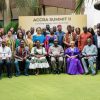Among the sacred names of our honored ancestors which we raise and praise this month, let us pay homage and pour libation for Paul Robeson (April 9, 1898—January 23, 1976), a truly Imhotepian man, in the classical African sense of the word, i.e., a master of many disciplines of knowledge and skilled practice directed toward bringing good in the world. Indeed, he was a critically acclaimed actor, singer, scholar, civil and human rights activist, orator and advocate of workers and everyday people everywhere. However, it is important to note that it is not simply his professional excellence and achievement which made him who he was and won for him accolades, honors and reverent respect around the world, but also his profound and steadfast commitment to his principles and his people and to humanity as a whole, especially ordinary, everyday people.
Dr. Mary McLeod Bethune paid Robeson a great and deserved honor when she described him as “the tallest tree in our forest,” especially in courage and service. For truly, he soared high and remained steadfast in courage and service in the most difficult and demanding of times. Indeed, he served his people and humanity well, and was a constant soldier, enduring great sacrifices without complaint or lessening commitment, and remaining unbending and unbreakable in his courage under continuous fire from an array of official and unofficial opponents and enemies.
This steadfast commitment and moral courage is clear in his refusal to be cowered, surrender his convictions or betray his principles during that terrible and terrorizing time of anti-communist hysteria, hate-mongering and suppression called the McCarthy Era. Although the U.S. government viciously persecuted him and whitelisted him, denying him the right to practice his profession as an artist and to travel abroad, he refused to bend, back down, or do deals. In his classic statement of self-definition and determined defiance, Here I Stand, Robeson says of this trying time, “I saw no reason why my convictions should change with the weather. I was not raised that way and neither promise of gain nor threat of loss has ever moved me from my firm convictions.” With intellectual and moral grounding from his father and mother, loving support from his siblings and larger family, he developed a discipline of mind and spirit that formed the foundation of his excellence, achievement and uncompromising resilience.
Living in London to escape the racist repression and restriction of America, he says “I ‘discovered’ Africa . . . (a) discovery which has influenced my life ever since . . . and I came to consider that I was an African.” Thus, he began to study many cultures and languages of Africa and “came to see that African culture was indeed a treasure-store for the world” and an instrument in the struggle for liberation.
Robeson appreciated the capacity of our people for self-liberation and the world historical significance of our struggle. He maintained that the African American struggle for freedom and social justice “represents the decisive front in the struggle for democracy in our country” and is crucial to “the cause of peace and liberation throughout the world.” He, thus, urged Black people to seize the historical initiative and engage in mass action which is both liberating and transformative in the world. And he identified effective leadership as indispensable to this project.
Leadership, Robeson argued, “has nothing to do with matters of headline prominence, personal achievement or popularity with the powers-that-be,” i.e., a status “white folks can bestow as a favor or take away as punishment.” He is “concerned, rather, with (Black) leadership in the struggle for (Black) rights” and other interests. He counts among this leadership not only those “directly in charge of organizations established for such purposes,” but also those in religious, social, political, labor and arts organizations committed to “our common cause.”
Robeson lists as the primary quality of Black leadership, “a single-minded dedication to their people’s welfare.” Indeed, their interests “must be subordinated to the interests of those whom (they are) leading.” It is a leadership which refuses to accept “a few crumbs for a few . . . as a ‘progress for the race’ ” and is willing to make the ultimate sacrifice of one’s life in the cause for freedom and justice. Therefore, he states, “He (she) who is not prepared to face the trials of battle will never lead to triumph.”
Equally important to Robeson’s concept of leadership is independence. Thus, he says, “Effective (Black) leadership must rely upon and be responsive to no other control than the will of their people” Certainly, we must have allies and should work to build strong relations with them, but “(Black) people’s movement must be led by (Blacks), not only in terms of title and position, but in reality.” Robeson criticizes the tendency to confuse accepting good advice with holding “the guiding reins” and “those practices of (Black) leadership that are based upon the idea that it is white power rather than (Black) power that must be relied on,” a sentiment that can come from conservative, liberal, and left quarters.
Robeson calls for courage and competence in varied fields and inclusion of the masses in our conception and practice of leadership. He especially stresses inclusion of women in the highest ranks of leadership. And he urges us to recover and remember well the lessons of our history and the vital leadership roles women have played and play in our liberation struggle. Indeed, he asks us, “who should know better than the children of Harriet Tubman, Sojourner Truth and Mary Church Terrell that our womenfolk have often led the way?”
Robeson speaks also of those leaders “who should be retired,” the shameless compromisers and coolers of the people’s righteous outrage; the old and new “quiet negotiators” who criticize mass action and argue for new ways to accommodate, adjust and wait for the good will of White folks. “Of course, there must be negotiations made in behalf of our rights,” he says, “but unless the negotiators are backed by an aroused and militant people, their earnest pleas will be of no avail.” Thus, Robeson ultimately relies on the people, aware and active in their own interests. He believes in their capacity to free themselves and with other progressive peoples create a world of freedom, justice and peace.
Finally, Robeson pays homage to the power of Black people’s spirit, a spirit of good, creativity, resilience and resistance. He says in praise of it: “Yes, that power of the spirit is the pride and glory of my people and there is no human quality in all of America that can surpass it. It is a force only for good: there is no hatefulness about it. It exalts the finest things of life—justice and equality, human dignity and fulfillment. It is of the earth, deeply rooted and it reaches up to the highest skies and (hu)mankind’s noblest aspirations.” And he concludes, “It is time for this spirit to be evoked and exemplified in all we do, for it is a force mightier than all our enemies and will triumph over all their evil ways.”
Dr. Maulana Karenga, Professor and Chair of Africana Studies, California State University-Long Beach; Executive Director, African American Cultural Center (Us); Creator of Kwanzaa; and author of Kwanzaa: A Celebration of Family, Community and Culture, The Message and Meaning of Kwanzaa: Bringing Good Into the World and Essays on Struggle: Position and Analysis, ww.AfricanAmericanCulturalCenter-LA.org; www.OfficialKwanzaaWebsite.org; www.MaulanaKarenga.org.















